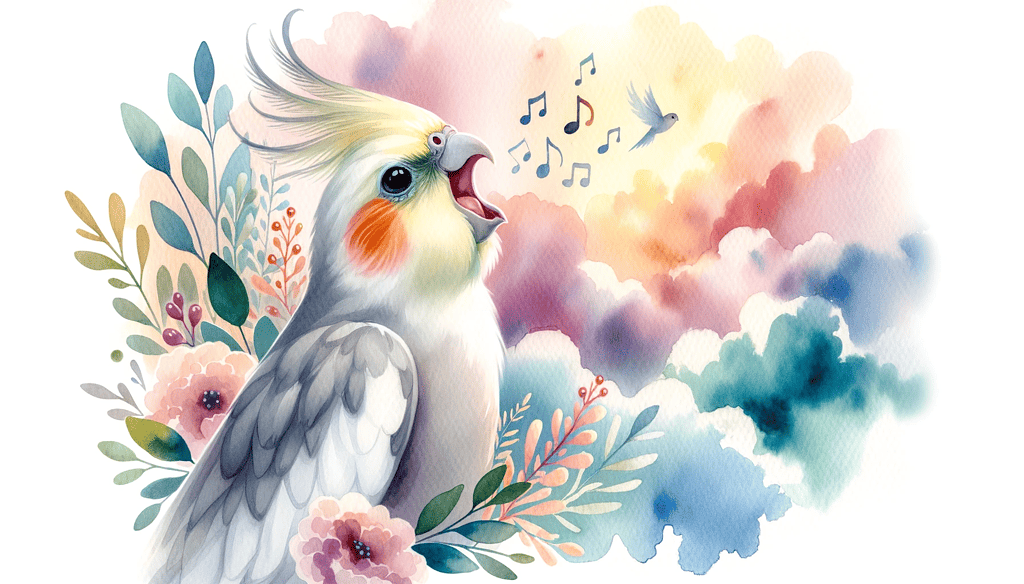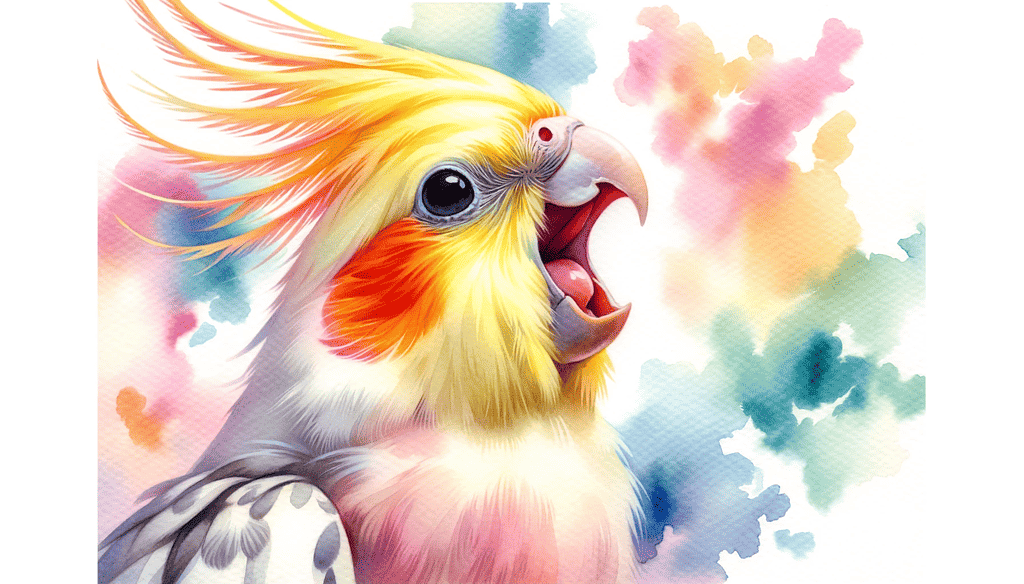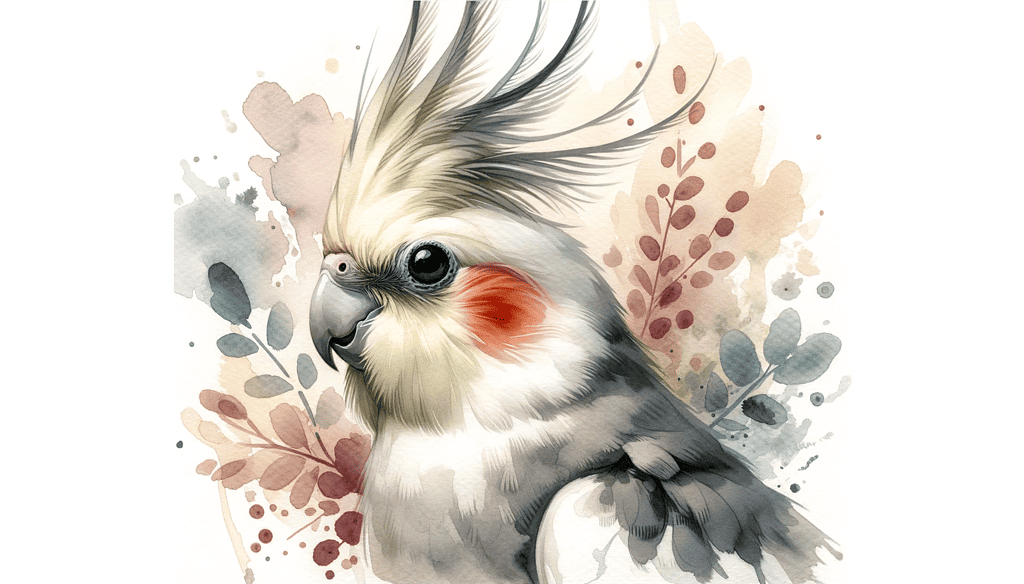
Cockatiels, with their vibrant personalities and striking crests, are among the most popular pet birds worldwide. But if you’ve ever been around one, you’ve likely noticed they can be quite vocal. Their range of chirps, whistles, and sometimes outright screams can leave many wondering: Why are cockatiels so loud?
As a general rule, cockatiels are naturally vocal birds that use their calls for communication, attracting mates, and expressing emotions. Their loudness can be influenced by factors such as their environment, health, and social interactions.
Curious about the nuances behind their vocal nature? Or perhaps you’re seeking ways to manage their volume? Dive into this vet’s guide to uncover the mysteries behind the vocal prowess of cockatiels and learn how to foster a peaceful coexistence with them.
Are Cockatiels Really Loud?
A Cockatiel is often perceived as a moderately loud pet. They utilize sounds to convey their curiosity, apprehension, and playful nature. They have a range of sounds in their repertoire. The contact call, for instance, can be quite loud and shrill. Some cockatiels can reach up to 80 decibels with these calls, which is close to the noise level that can be harmful to human ears. However, unless a cockatiel is feeling lonely or distressed, these contact calls are not frequent.
How Often Do Cockatiels Make Noise?
Cockatiels, like other parrots, have varying noise levels throughout the day. A solitary cockatiel or a pair will likely enjoy quiet moments, engaging in activities like playing with toys, foraging, or resting. However, there are specific times and triggers that might increase their vocalizations:
- Morning and Evening: Just like many of us enjoy a good stretch and yawn in the morning, cockatiels often greet the day with a series of chirps and calls. Similarly, as the day winds down, they might get vocal again.
- Response to Household Noises: Whether it’s the sound of a vacuum, music, or chatter, cockatiels often feel the need to join the chorus.
- Seeking Attention: If they’re feeling lonely or bored, they might vocalize to get your attention.
- Hearing Other Birds: If they hear another bird, even from a distance, they might respond with their own set of calls.
- Mating Calls: During certain times, especially if they’re seeking a mate, their calls might increase in frequency and volume.
Frequency of Cockatiel Noise During Different Times of the Day
| Time of Day | Frequency of Noise | Common Triggers |
| Morning | High | Greeting the day, responding to early morning household activities |
| Afternoon | Moderate | Playtime, responding to household noises |
| Evening | High | Settling down for the night, reacting to evening household activities |
Reasons Behind Their Loudness
Cockatiels, with their vibrant personalities, have various reasons for raising their voices. Here are some of the primary reasons:
- Seeking Attention and Bonding: Cockatiels crave interaction. If they feel you’ve been ignoring them or they simply want some quality time with you, they’ll vocalize to get your attention. Remember, in the wild, they’re used to being part of a flock, so they naturally seek companionship.
- Reacting to Environmental Changes: A sudden change in their environment, like a new object in the room or a change in their cage’s location, can make them vocalize more. They’re merely trying to understand and adjust to the change.
- Potential Health Issues or Discomfort: If a cockatiel is in pain or feeling unwell, they might vocalize more. It’s their way of signaling that something’s not right. Regular check-ups and keen observation can help ensure their well-being.
- Breeding and Mating Calls: Especially during mating seasons, cockatiels become more vocal. Males sing to attract females, and their calls can be quite persistent during this period.
Factors That Influence Their Loudness

Before we delve deeper into specific factors, it’s essential to understand that each cockatiel is unique. Their volume and frequency of vocalizations can be influenced by a combination of factors:
1. Age and Gender
The age and gender of a cockatiel play a significant role in their vocal behavior. Male cockatiels, especially those in their prime, are known for their singing abilities. They use these songs to attract mates and communicate with their flock. Females, on the other hand, are more reserved but can be equally vocal when communicating with their flock or signaling distress.
As cockatiels age, just like us, they undergo changes. Older cockatiels might not be as vocal as their younger counterparts. However, they still communicate their needs, joys, and discomforts through their calls.
In my years of caring for these birds, I’ve noticed that each morning, like clockwork, my male cockatiel greets the day with a series of chirps and melodies. It’s his way of saying, “I’m here, and I’m ready for the day.” On the other hand, my female cockatiel is more subdued, often responding to his calls with softer chirps.
2. Time of Day
Cockatiels have their own internal clocks. They’re most active during the early morning hours and late afternoon. During these times, you can expect them to be more vocal. The morning calls are often a mix of greeting the day and signaling their readiness for breakfast. As the day winds down, their evening vocalizations are a way of settling in for the night.
3. Loneliness
Cockatiels are inherently social creatures. In the wild, they’re used to being part of large flocks, constantly interacting and communicating with their peers. When they’re kept as pets, especially if they’re the only bird in the household, they can experience feelings of loneliness. A lonely cockatiel might call out more frequently, hoping for a response from a fellow bird or their human companion.
4. Diet
Diet plays a crucial role in a cockatiel’s overall well-being, including their vocal behavior. A well-balanced diet ensures they have the energy and nutrients to be their chirpy selves. However, certain foods can influence their vocalizations:
| Diet Type | Potential Impact on Vocalizations |
| Balanced Diet | Regular vocal patterns, active behavior |
| High Sugar Foods | Increased energy, possibly more vocal |
| Lack of Essential Nutrients | Decreased energy, less vocal |
| Fresh Fruits & Veggies | Healthy vocal patterns, active behavior |
| Too Many Treats | Possible increased vocalizations due to energy spikes |
5. Insecurity
Cockatiels, despite their feisty personalities, can feel insecure at times. Changes in their environment, the introduction of new pets, or even rearranging their cage can trigger feelings of insecurity. They might call out more, trying to assert their presence.
6. Health and Well-being
Illness or discomfort can directly impact their vocal behavior. Regular vet check-ups can help catch potential issues early on. A healthy cockatiel is not just physically active but also vocally active, engaging with its surroundings and its human companions.
How to Manage and Respond to Their Loudness?

Navigating the world of cockatiel vocalizations can be a journey, but with the right approach, you can create a harmonious environment for both you and your pet.
- Observe and Understand: Before reacting, take a moment to understand why your cockatiel might be making noise. Are they hungry? Bored? Seeking attention?
- Stay Calm: Responding with frustration or anger can exacerbate the situation. Birds can pick up on our emotions.
- Distract and Divert: If your cockatiel is being particularly noisy, try diverting their attention with a new toy or activity.
- Consistent Training: Set aside regular training sessions using positive reinforcement techniques.
- Seek Expert Advice: If you’re struggling, don’t hesitate to seek advice from a vet or bird behaviorist.
- Setting Up the Right Environment: The environment plays a significant role in a cockatiel’s behavior. Ensure the cage is positioned in a quiet place away from direct sunlight and drafts. A larger cage can also help reduce stress and noise.
Conclusion
Understanding the vocal nature of cockatiels is key to a harmonious relationship with your feathered friend. Remember, their vocalizations are a form of communication. By paying attention and responding appropriately, you can ensure a happy, healthy, and relatively quiet life with your cockatiel.
If you found this guide helpful, please share it with fellow bird enthusiasts. Your experiences and insights are always welcome in the comments below.
Frequently Asked Questions
Why is my cockatiel screaming all of a sudden?
It could be reacting to a change in its environment or might be feeling lonely or bored.
How can I calm my noisy cockatiel?
Ensure its basic needs are met, provide toys for stimulation, and consider training techniques.
Is it normal for cockatiels to be noisy all the time?
No, constant noise can be a sign of distress or discomfort.
Are male cockatiels louder than females?
Generally, males are more vocal as they use song to attract mates.
